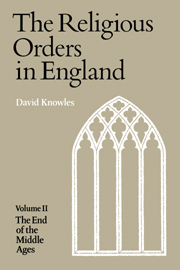Book contents
- Frontmatter
- Contents
- Preface
- List of Abbreviations
- Part One The Historical Framework
- Chap. I The opening of the period
- Chap. II Monks and canons at the university, 130c–1450
- Chap. III Patrons and architects: Ely and Gloucester
- Chap. IV Portraits of monks
- Chap. V Monks and friars in controversy
- Chap. VI Trends in speculation: Ockhamism, justification and grace
- Chap. VII Criticism of the religious in the fourteenth century
- Chap. VIII The spiritual life of the fourteenth century
- Chap. IX Developments within the orders: I
- Chap. X Developments within the orders: II
- Chap. XI The fortunes of the Cluniac houses and the alien priories
- Chap. XII The loosening of discipline
- Chap. XIII King Henry V
- Chap. XIV More portraits of monks
- Chap. XV The second century of visitation, 1350–1450
- Chap. XVI The spiritual life of the fifteenth century
- Part Two The Institutional Background
- Appendix I Chaucer's monk
- Appendix II Henry V and the Westminster recluse
- Appendix III Regulars as bishops
- Bibliography
- Index
Chap. VI - Trends in speculation: Ockhamism, justification and grace
Published online by Cambridge University Press: 28 January 2010
- Frontmatter
- Contents
- Preface
- List of Abbreviations
- Part One The Historical Framework
- Chap. I The opening of the period
- Chap. II Monks and canons at the university, 130c–1450
- Chap. III Patrons and architects: Ely and Gloucester
- Chap. IV Portraits of monks
- Chap. V Monks and friars in controversy
- Chap. VI Trends in speculation: Ockhamism, justification and grace
- Chap. VII Criticism of the religious in the fourteenth century
- Chap. VIII The spiritual life of the fourteenth century
- Chap. IX Developments within the orders: I
- Chap. X Developments within the orders: II
- Chap. XI The fortunes of the Cluniac houses and the alien priories
- Chap. XII The loosening of discipline
- Chap. XIII King Henry V
- Chap. XIV More portraits of monks
- Chap. XV The second century of visitation, 1350–1450
- Chap. XVI The spiritual life of the fifteenth century
- Part Two The Institutional Background
- Appendix I Chaucer's monk
- Appendix II Henry V and the Westminster recluse
- Appendix III Regulars as bishops
- Bibliography
- Index
Summary
About the middle of the fourteenth century a very real change took place in the interests and outlook of philosophers and theologians at the English universities. The early decades of the century had been for Oxford as for Paris a time of criticism and eclectic thought. The age of the absorption and interpretation of Aristotle had come to an end with the Paris condemnations of 1277, which followed hard upon the deaths of Bonaventure and Aquinas, and the early death of Duns Scotus in 1308 had taken from the scene the last great builder of a system embracing the whole of philosophy and theology. The acutest minds of the years immediately following were mainly engaged in criticizing, blending or prolonging certain important features of one or other of the great thinkers of the preceding generations, or in elaborating particular aspects of philosophy and theology. There was a noticeable drift away from metaphysics and natural theology, and a tendency to separate the realms of faith and reason. The change, however, was slow and not abnormal, and took place at a similar rate both at Paris and Oxford, which continued as the two great international centres to attract and interchange students and masters. Shortly before the middle of the century, however, two changes occurred, the one in the realm of ideas, the other in that of events, which profoundly modified this state of things.
- Type
- Chapter
- Information
- Religious Orders Vol 2 , pp. 74 - 89Publisher: Cambridge University PressPrint publication year: 1979



